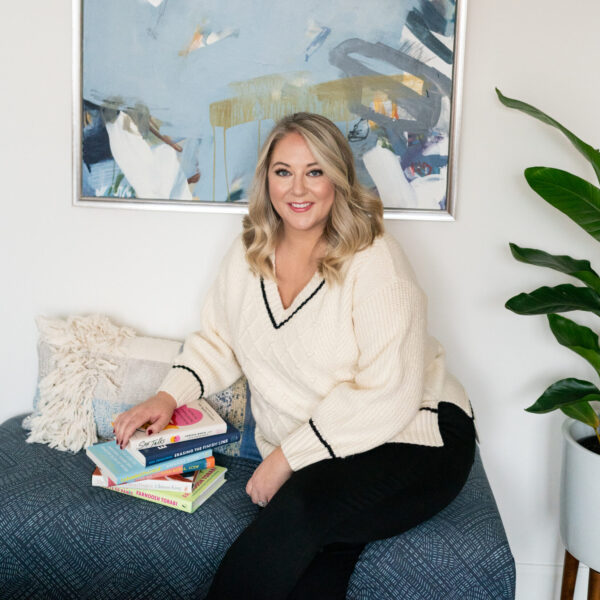
Inside The Mind Of A Publishing Editor
I’ll share key takeaways from my in-depth and far-reaching conversation with her in this blog post. You’ll have an inside look into what she looks for in book proposals, how she stewards authors through the process, and why acquiring a book is a mix of mystery and science.
Inside The Mind Of A Publishing Editor
How would you like an all-access pass inside the mind of a publishing editor?
Meet Hannah Robinson.
Hannah is a publishing editor of practical nonfiction at GCP Balance, an imprint of Hachette Book Group.
Before joining Hachette, she worked at Simon and Schuster and HarperCollins, publishing various award-winning best-selling practical nonfiction titles and commercial fiction.
Hannah loves to spend time with interesting people, diving headfirst into their worldviews and thinking about how to help their work find its way to the readers who need it.
She’s on a mission to improve lives, one book at a time, by championing the varied ways authors tackle life’s challenges, unveiling groundbreaking research, and bringing their profound narratives to life.
Recently, I invited Hannah to be my guest on the Bound + Determined podcast.
I’ll share key takeaways from our in-depth and far-reaching conversation in this blog post. You’ll get an inside look into what she seeks in book proposals, how she stewards authors through the process, and why acquiring a book is a mix of mystery and science.
In the first section, we’ll explore what Hannah looks for when she assesses book proposals in the nonfiction genre.
Assessing Proposals: Memoir and Nonfiction
Hannah has had thousands of proposals come across her desk as a publishing editor. Here are the top three things she looks for as she assesses each proposal.
Clarity of Idea
You must clearly and convincingly communicate what you’re offering with your book and how you plan to solve the problem or fulfill the reader’s desire.
The clearer you are on your vision and mission for the book, the better your editor and publisher can support you through the process.
Audience Awareness
The next critical component of a compelling book proposal is an intimate knowledge of your reader. To get a handle on your ideal reader, Hannah and I agree that you must be able to answer these questions with absolute certainty:
- Who needs your work?
- Who is your book for? Hint: it’s not for everybody.
- What problems, motivations, struggles, and experiences do they share?
You’re at an advantage when you know all the nuances of your audience. The clearer you can be for yourself and your editor, the more successful you’ll be.
Comp Titles
I teach my Book Proposal Blueprint students that nailing the Competitive Analysis section of your book proposal is critical for publishers and agents to know exactly where in the market you’ll fit and whether there is a need for your work.
Hannah shares that publishers have a particular way of looking at the comp section and she suggests including:
- What other authors are writing similar books
- What conversations are happening around the topic
- How do you differ or align with other books
- What fresh perspective do you have to offer
- What frameworks prove to be compelling, and how are they laid out
You can impress your potential editors by communicating a clear, shared vision of where your book will fit in the marketplace.
You want to prove that people are interested in the topic and that your vision or point of view differs from what’s out there.
Hannah also breaks down the two-pronged approach she looks for when assessing proposals.
Competitive Titles vs Comparative Titles
A simple way to think about the difference between Comparative and Competitive tiles is that comparative books are similar to your idea, and competitive books compete for the same audience.
In your Comparative Analysis, distinguish yourself against similar books by noting how you speak to a different audience.
Include your framework or Big Idea, and note how it differs from what is out there.
You may have new research or a proven process that helps people achieve a transformation. Brainstorm all the ways that what you offer adds to the conversation.
The books that fit into the Competitive Analysis speak to the same audience as you. These books might not be on precisely the same topic or take the exact same approach, but these are the readers that you’ll be fighting for.
Since you’ll be fighting for their purchasing dollars and attention, you must answer these questions:
- Why is your book worth their $30?
- How do you stack up in that space?
- How are you able to create different messaging around your book?
Keeping both approaches in mind will help you identify where you stand out in the marketplace and carve your own niche.
And before you start to stress about all the other books out there similar to yours, don’t panic!
In my Book Proposal Blueprint program, students tend to feel defeated when first creating the comp section, but quickly realize this is where they get to highlight what they love about the other books in their space, as well as highlight what makes THEM different!
Publishers tend to be risk-averse, meaning that similar books in the market are okay! They are proven to sell. But, you must show the publisher how your book will be different, updated, new, and worth their time.
There is space for more. Do the comp research in the spirit of curiosity and discovery, not a limitation.
Now that we’ve identified key areas, let’s move on to the Chapter Samples of your book proposal.
Common Missteps in Book Proposals
When Hannah reviews sample chapters, she’s seeking a clear outline of how you plan to move through the material and how you’ll best present it to the reader.
For example, if you’re saying your book is practical and actionable, but the sample chapter is purely a memoir, there’s a disconnect.
That means you’ll have to clarify it for the editor, making it much harder for them to sell their team because they have to do work to convince them.
Instead, present a sample chapter that clearly tells the reader what to expect and how you’ll get them there.
I advise my students to include the story or overall message in one of the sample chapters and include a later chapter that shows either the tipping point moment or teaches something unique to their framework in their style.
In addition to the meat of the chapters, Hannah also wants to see if the authors’ voice is on the page and if she genuinely enjoyed reading the work!
The sample chapters don’t have to be perfect, but they need to spark the interest of the editor so they can apply their superpowers.
More on that in the next section.
Hannah’s Publishing Editor Superpower
Hannah is one of the most talented and involved publishing editors in the business, and she has what I like to call “editor superpowers.”
Hannah can look at a book outline and say, here’s what I’d love to see a little bit more of, and can help mold it.
Instead of someone merely redlining or asking questions, she becomes a thought partner dedicated to making your book the best it can possibly be.
She works with authors to refine and nuance the work based on what she knows to be true about bestselling books.
And while some of the process is tried-and-true, Hannah agrees that there’s a science and a mystery to choosing winners.
The Science and Mystery of Publishing
I always say that the idea of science and mystery feels so accurate to the book process, and Hannah agrees.
She says, “There’s a hugely intuitive component that comes forward. At this point in my career, I’ve read 1000s of proposals, and after a while, you get a rhythm and a sense of what will be right. Part of my privilege in my job is choosing projects that will be successful in the market and that I will be the right editor and champion for.”
If you’re looking for an editor to work with on your book proposal, Hannah has some suggestions to help you identify the right person.
- Do they connect with your idea, your voice and the particular concept in the book and have a vision for bringing it forward?
- Can they clearly lay out the next steps with thoughtful care and coaching?
- Do they have the lens of the reader and publisher?
- Is their editorial heart in it?
It’s also a bonus if your editor understands how your platform fits into the equation. Listen to our in-depth discussion about author platforms starting at 24:45 here, including what metrics really matter.
How to Impress A Publishing Editor In Your Author Meeting
If your proposal gets the interest of publishers, you’ll likely be asked to have a meeting. Hannah’s job is to lead author meetings where she has honest, in-depth conversations about their work. Hannah notes that the initial meeting is where she and the writer get to feel their chemistry and working style, so it’s vital for authors to show up confident and prepared.
Simply put, if you consider your proposal your job application, the author meeting is your job interview.
So, be ready with an elevator pitch that clearly states what your book is about, why you are the one to write it, who it’s for, and how you plan to sell it.
At this first author meeting, Hannah is considering the following questions:
- How does the author’s vision line up with my vision of the book?
- Do we have the same perspective from the jump?
- How do we work together?
- Is the author open to thinking differently about things and feedback?
- Are we both excited to be working together?
- Does this book make sense as the author is describing it?
- Is there urgency, and do readers need it?
Seeing inside the mind of a publishing editor allows you to be as prepared as possible to make your case for your book and recruit the creative and strategic thought partnership you need to make your book a reality.
Key Takeaways From A Publishing Editor
As we wrap up this glimpse into the mind of seasoned publishing editor Hannah Robinson, let’s recap some key takeaways.
First, it’s all about that book proposal. It’s your blueprint, your master plan, and it needs to shine with clarity.
You’ve got to convince the powers that be that your book is the solution to a real problem, or that your story can stand out and positively impact people.
But don’t stop there; you’ve also got to know your readers inside and out. Who are they? What keeps them up at night? What makes them tick? Knowing this stuff is gold when crafting your book.
Your Comp Title Analysis is also key. This is your chance to show why your book is not just another title on the shelf. Research is your best friend here. Figure out who’s swimming in the same waters as you and who you’re fighting for those reader dollars. Explain why your book is worth it.
When it comes to chapter samples, avoid the pitfall of providing vague or off-topic. Your samples should give a taste of what your book is about and how you plan to deliver on your promises. And here’s a pro tip: your voice as an author should be loud and clear from those pages. Make the editor eager to read more.
In publishing, there’s a blend of science and mystery. It’s data-driven, but intuition plays a big role. Editors like Hannah have a sixth sense for what will work. So when picking an editor, ensure they’re not just on board with your vision but also excited about your project.
As you step into your author meeting – think of it as a job interview – be prepared, concise, and passionate about your book.
It’s not just about convincing your editor; it’s about finding that magical working chemistry. Understanding what happens in a publishing editor’s mind is your ticket to a successful literary journey.
So, there you have it! If you want help with anything discussed in this post, reach out here. I’d be honored to share my expertise on crafting a book proposal that captures the attention and gets acquired by editors like Hannah.
Share this post!
The Truth About Imposter Syndrome & Inspiration
So, if you’re ready to kick imposter syndrome to the curb and grab your book-writing journey by the horns, you’re in the right place.
Rethinking Bestseller
Becoming a bestseller is a wonderful accomplishment, but for many who seek to see their books on shelves, it’s not the end-all-be-all, and for a vast majority, it’s a goal that can be more harmful than good.
Write a Book in 2024: Activate Your Plan
Activate your plan to write a book in 2024 by taking small, intentional steps that are proven to create momentum and inspiration.
Need a roadmap to publishing your book?
I’ve got you covered!
Enter your name and e-mail below and I’ll send you my roadmap for developing your book idea. You’ll learn how to attract the right agents and publishers, and be on your way to getting your book out into the world!


